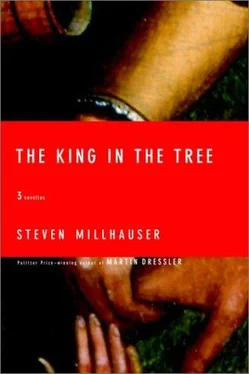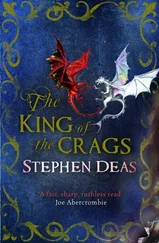“He has gone back,” she then said.
Brangane revealed the stratagem to me, which was executed at precisely the time I believed I had nothing to report. The blind harper, who was not blind, was Tristan’s messenger. He informed the Queen, by means of a message delivered to Brangane, that Tristan had crossed over from Lyonesse and would devise a way to enter the castle. He might easily have arranged to meet her in the orchard, but he wished to penetrate the castle itself. He and five companions disguised themselves as pilgrims and entered the castle gate; under their humble robes they wore ring mail and swords. For three days they dined among other guests in the great hall, walked in the courtyard, prayed in the chapel. Tristan revealed himself by signs to the Queen and visited her alone in her garden by day and in the orchard by night. He remained for three days and three nights; during the third night he stole into my chamber and returned my dagger. At daybreak he departed for Lyonesse, across the sea, where he lived in his ancestral castle. It was to this castle that he had fled after the night of discovery under the pear tree. There he had lived, sorrowing for his lost Queen, until at last, searching for death in the German wars and not finding it, he had plotted a return to Cornwall in the guise of a pilgrim, to pledge his undying love.
Such was Brangane’s story, delivered breathlessly beside the fountain. As she spoke I saw in memory the proud youth from Lyonesse, who long ago came riding to his uncle’s court in Cornwall — came riding with such easy grace that it was said he rivaled the King himself. The King had seen in that face the face of his dead sister, Blanchefleur, and I had seen the face of the young King. And in my mind, for a moment, I confused the two of them, the young Prince whom I loved and whom I had instructed in the arts of fencing and dialectic, and the young lord who ten years later came riding into Cornwall with the bearing, the elegance, the hands, the very look of my beloved and still youthful King.
When I asked Brangane why the Queen had not fled to Lyonesse with Tristan, she sat up a little straighter. “She is married to the King,” she replied; in her voice I detected a note of reproach.
Tristan does not return. The Queen’s face has become sharpened by unhappiness, simplified by longing; her life has contracted to the single act of waiting. It is as if she is shedding herself piece by piece, divesting herself of superfluous looks and gestures, until she has come to resemble the figure of a stone saint on a tympanum, who forever must express, in a single genuflection, the vast multiplicity of poses that constitute a lifetime. The King too is waiting, but without hope: he is waiting for the Queen to forget Tristan and turn her attention to him. Because unhappiness has made him patient, and because he is without hope, he tends to the Queen and even imagines her desires: no longer does he sleep in the royal bedchamber but has removed himself to Tristan’s chamber. Sometimes he hears her return from the orchard, where she waits nightly for Tristan, despite the cold weather. Then he lights her way into her chamber, summons a servant to stoke the fire in the hearth, and wishes her a good night before returning to Tristan’s chamber.
He has brought a sparrow hawk into his new quarters, where it sleeps on a wooden perch beside his bed. There is also his tame raven, which walks about on the floor or sits on the King’s shoulder. Sometimes, at daybreak, the raven gives a loud squawk and flutters up onto the ledge of the window. Once I saw it sitting on top of a carved falcon on a bedpost.
“The Queen wishes to see you in the garden.” These were the hushed words breathed at me by Brangane as I came upon her in the shadow of the arched doorway opening from the great hall to the steps leading down to the courtyard. I had never spoken alone with the Queen, and as I made my way to the tower that opened into the garden, I wondered what pitch of desperation had driven her to request this meeting with the King’s close companion, one of the six men who had stared down at her with drawn swords as she lay under the pear tree. Brangane was waiting for me at the tower door. She led me into the garden, along the sanded path shaded by almond and walnut trees, past the fish pond, the herb garden, the square beds of roses and marguerites, to the high hedge with its arched opening. I followed her along the maze of hedge paths, wondering if I was being led to the famous pear tree; evidently we took a different series of turns, for all at once we emerged in a small grassy plot overarched by latticework covered with vines. The Queen was seated on a yellow silk cushion on a box-shaped bench covered with turf, across from a second turf bench on which lay a white silk cushion worked with gold. She motioned me to sit down as Brangane left us to ourselves.
“I am told you may be trusted,” she said, in a tone that seemed to me haughty and mistrustful. She looked at me warily, as if wondering how far she might go in usurping my loyalty to the King.
“Brangane”—I spoke carefully—“flatters me.”
“No one flatters you!” she said sternly. All at once she stood up — she seemed to tower over me, like an angry father — and as I sprang to my feet I had the sensation that she was going to strike me in the face.
“Have you heard from him?” she said, with a kind of violence. “Why doesn’t he come? Something is wrong.” There was nothing angry in her now — only an energy of unhappiness.
“I’ve heard nothing,” I said, startled by the change in her face, tense with longing, dangerous with sorrow.
“Something is wrong,” she said again, sitting down on her bench. She looked worn and small there, like a tired child.
“If I hear anything—”
“Does he trust you?” she said abruptly, looking up at me.
I hesitated. “He has every reason to.”
“Then if you hear something — anything—”
“Yes, I will let you—”
She stood up again. “Something is wrong.” She said it for the third time, but remotely, as if she were no longer listening to herself. Then, turning to look at me: “Thank you for”—she thought about it—“for being a good man.”
The words startled me — angered me — for it had been a long time since I was able to think of myself as a good man— but she uttered them with such force that I bowed my head in reply, even as I felt the blood beat in my neck.
I think of the change in the Queen, when she stood over me in the garden: the violence of her unhappiness, her face sharp with longing. At that moment, when I felt her passion, her features were unpleasant to look at. Is that her secret for Tristan? Is it when she stops being beautiful to look at that she becomes irresistible to him?
There is news of Tristan — news that must be concealed from the Queen. A fearful rumor! How long will she be spared?
I had it from a minstrel who traveled through Arundel before crossing the sea to Cornwall. He has heard that Tristan of Lyonesse has married the daughter of the Duke of Arundel. She is said to be very beautiful.
Tristan married! It is laughable. It can’t possibly be true. What troubles me — what frightens me — is the name of the Duke’s daughter. She is called Ysolt — Ysolt of the White Hands.
Even as I rage against the rumor, I feel the spell of that name. I imagine Tristan walking beside this second Ysolt, this Ysolt who is not Ysolt, this not-Ysolt who is Ysolt. If he cannot have Ysolt, then he will have — Ysolt. He is drawn to her beauty, but nothing in her beauty can compare with the beauty of her name: Ysolt. Tristan can never marry Ysolt, but he can surely marry Ysolt. His choice is between Ysolt and Ysolt: an Ysolt who is hidden from view, a memory-Ysolt, an Ysolt who is scarcely more than the breath of her name, and a living, laughing Ysolt, a vivid and visible Ysolt, an Ysolt who walks in the sun and casts a strong shadow. All day in exile he thinks of Ysolt, all night in his empty bed he dreams of Ysolt — and slowly, from his dream, a real Ysolt steps forth. How can he not reach out and seize her?
Читать дальше












